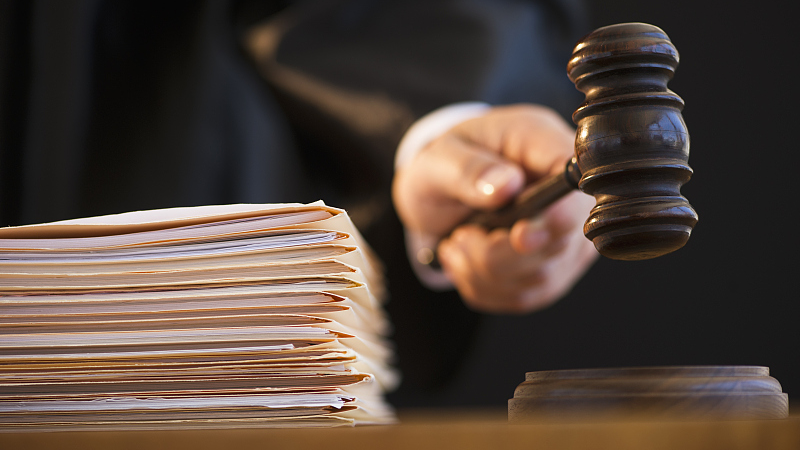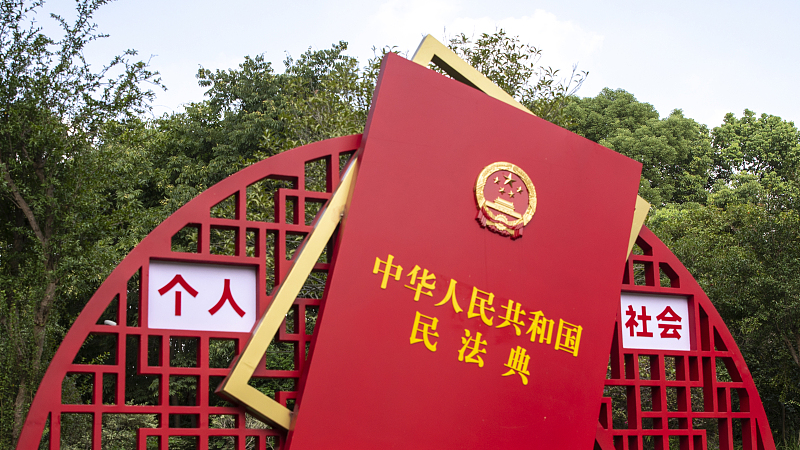
Editor's note: Kong Qingjiang is the dean of the School of International Law at the China University of Political Science and Law. The article reflects the author's opinions, and not necessarily the views of CGTN.
The 10 years following the 18th National Congress of the Communist Party of China (CPC) have witnessed unprecedented development of the rule of law in the country, and have thus been recognized as a golden decade for the rule of law. Throughout the new era, the CPC Central Committee with Comrade Xi Jinping at the core has incorporated the overall law-based governance into the "Four-pronged Comprehensive Strategy," and made steady and remarkable progress towards law-based governance.
As the CPC leadership is aware, legislation is the forerunner of the rule of law. Over the past 10 years, new laws have been introduced by the legislatures at all levels for newly emerging areas, key subjects and foreign-related areas. There are an array of laws and regulations on national security. From the enactment of the overarching National Security Law of 2015 and Law of the People's Republic of China on Safeguarding National Security in the Hong Kong Special Administrative Region of 2020, to the Cybersecurity Law of 2016, the Data Security Law and Personal Information Protection Law of 2021, Beijing has woven a network for national security amid external challenges and risks.
Moreover, existing regulations have been made coherent and systemized via concerted amendments, interpretations and abolishments, to lay a foundation for good governance. Codifying the country's civil law was a landmark for China's legislative history. After five years, the Civil Code, which incorporated the General Principles of Civil Law, Property Law, Contract Law, Guarantee Law, Marriage Law, Adoption Law, Inheritance Law and Tort Liability Law, was passed on May 25, 2020, and ushered the country into the era of civil code.
Respecting and protecting human rights is a constitutional principle in China. In recent years, Beijing has upheld the dominant position of the people, taking a people-first approach and ensuring that the people are the masters of the nation. The state is ensuring the rights of the people, protecting their interests, and promoting a legislature based on rational analysis, strict law enforcement, judicial justice, and observance of the law by all citizens. There's progress in modernizing the system and capacity of state governance. Beijing has protected people's rights and freedoms in accordance with the law, while its people duly fulfill their obligations.
An efficient and transparent administrative system plays a crucial role for the rule of law. In the past decade, rules on administrative decision-making procedures were enacted by governments at various levels, from the State Council to the local people's governments. Broader public participation, expert deliberation, risk assessment, legality review, and collective decisions have become standardized procedures in major administrative decision-making, while decision-making process is more scientifically based in order to contribute more to the welfare of the people nationwide.
Throughout the new era, the government has promoted the openness and transparency of public affairs in accordance with the law. The authorities are aware that government information must be accessible to the people, understood by the people, and under supervision of the people. The online government information data service platform has been established, and information disclosure has been standardized with its accessibility enhanced. Accordingly, law enforcement agencies must release the video-tapes of law enforcement activities online to the parties or the public in accordance with the law and thus justice gets delivered in a visible way. By demanding, "making every law enforcement activity a textbook case" has become a goal to pursue among law enforcement agencies.

A series of themed activities of the first Shanghai Rule of Law Culture Festival are held in Shanghai, China, September 17, 2022. /CFP
A series of themed activities of the first Shanghai Rule of Law Culture Festival are held in Shanghai, China, September 17, 2022. /CFP
The judiciary is the last line of defense to maintain social fairness and justice, as well as judicial protections of human rights. The reform of the judicial system has been carried out to build a fair, efficient and authoritative socialist judicial system. Over the past 10 years, the CPC Central Committee has solved deep-rooted problems impacting justice and fettering judicial capacity.
A systematic top-down design was employed to implement judicial reforms, as numerous policy documents and various reform measures were put in place gradually. The judiciary has upgraded efficiency and credibility, along with the people's satisfaction towards, the judiciary have surged. Such judicial reforms are not only unprecedented in the history of judicial civilization in China, but rare in the history of judicial reforms worldwide.
Strengthening foreign-related legislation would remain a focus for rule of law construction. Beijing has implemented a legal system of anti-sanctions, anti-interference, and counter-"long-arm jurisdiction," a response to "long-arm jurisdiction" abuses against Chinese institutions and individuals by the U.S. and other countries.
The decade saw the continuous promulgation of the Measures for Security Review of Foreign Investment , the Export Control Law, the Rules on Counteracting Unjustified Extra-territorial Application of Foreign Legislation and Other Measures and the Anti-Foreign Sanctions Law. These legal instruments have enriched the legal toolkit to safeguard sovereignty, national security and core development interests of the country.
Beijing's pursuit for the rule of law in the decade has also been extended to the international arena by promoting the rule of law with its international relations.
In light of the notion of a community with a shared future for mankind, China has formulated international rules to address the global issues affecting the world and reforming global governance. Beijing has participated in forming international rules in the fields of anti-corruption, climate change, oceans, polar regions to ensure continuous improvements of international rule of law, while China's voice can be heard.
The country stands as an advocator for all countries to abide by international law centered upon the Charter of the United Nations and the universally recognized basic principles of international relations. China stands opposed to disguised rule-based international order, imprinting firm marks on development of the rule of law in international relations.
Comprehensively advancing the rule of law is a long-term and important historical task. The CPC Central Committee has introduced the "three-step" long-term strategy of building a rule-of-law China in the future, that is, by 2025, a socialist rule of law system with Chinese characteristics will be initially formed, and by 2035, a country under the rule of law, a government under the rule of law, and a society under the rule of law will be basically established. The government, under the strong leadership of the CPC Central Committee with Xi Jinping at the core, is implementing Xi Jinping's thoughts on the rule of law, to unswervingly follow the path of socialist rule of law with Chinese characteristics, and to march ahead with good law and good governance for now and for the future.
(If you want to contribute and have specific expertise, please contact us at opinions@cgtn.com. Follow @thouse_opinions on Twitter to discover the latest commentaries in the CGTN Opinion Section.)

